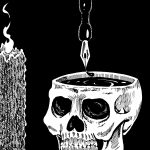
Last month I posted a quick and dirty poll about the feelings role-players have about in-game death when it occurs. The results were interesting although I think I could have been more specific. Perhaps I would add in a few other options should I ever post another similar poll. I published the results here if you have not already seen them in the original post. In addition, I try to clarify my intentions with the poll.
Death Poll Results
Above all, here are the results of the poll that concluded 11/28/2019. The original blog entry and poll results are no longer available, sorry.
My Poll Answer
Subsequently, where I fall in the results would be a combination of the top three options. Although on the poll itself, I would have probably selected the top option. My reason is that I want death to mean something. Therefore, the occasion would be somber, maybe my in-game plans are dashed by the death (this has happened with my evil characters). This would allow my character to express their feelings about the situation in their own way. I find it fun to try to figure it out and then carry it out.
I like trying to construct and figure out my character’s emotional life. It’s fun to build their backgrounds, physical bodies, and spiritual qualities as well as working out their abilities and powers. After that, it is all about building their actual hearts during role-play taking every opportunity to explore them as well as using them to explore the game world.
What I Intended
I intended to try to find out how other Players and GM’s feel about the event of the death of Player Characters at their tables. Consequently, judging by the comments, I was perhaps not clear enough on that front. I was (and am) interested in the emotions directed at the game and its participants that character death provokes. That was what I was pursuing with this poll.
What I Forgot
A few of the comments about the poll did point out that I had forgotten at least two points. These being Death for Drama’s Sake and In-Game Death serves to reinforce the idea of Death as a Looming Force. Death for Drama’s Sake means that a player willingly conspires with Games-Master to have their character die for dramatic or story purposes essentially, death for the sake of the narrative.
This to me seems to be more applicable to more story-oriented games. However, I do utilize NPC’s in a very similar manner. I try to get the NPC familiar with the Players even perhaps becoming a friend. When the Players become attached I try to manipulate that relationship to my ends. This can range anywhere from dramatic death hopefully towards an end not just for drama, to betrayal by an ally. In the latter case, if the character survives I try to have them become a thorn in the Players’ sides maybe even evolving the NPC into a major villain (see Dark Lords: Building Better Lords of Evil).
Death As Looming Force
I also seemed to forget to address Death as a looming force. If there is a potential for PCs to die even on a bad roll or badly misjudging a dangerous situation then death is ever-present. However, this just adds in the risk factor and the attached thrill when the PCs escape or power-through dangerous scenarios. A Player Character death just serves to bring this looming presence to the fore of everyone’s mind, fully integrating it and making it an actual part of the game world. I might have still left this option off the poll though even had I thought of it. The reason is that I am more interested in what emotions the participants are feeling generally directed towards the game precipitated by the actual death rather than about the general presence of it.
There are inevitably angles that I have still missed. However, as in-game death and even the narrowed subject of the general emotions it brings out, death is still a very broad subject with tons of nuance all over the place. Polls are meant to be focused and provide information about opinions that can be used to build generalities about the polled group. Note this poll was very small serving more of an opinion poll of those who bother to read my blog.
How I See In-Game Death
I see in-game death as a natural risk of adventuring, if you are doing it right then you run the risk of dying sometimes horribly. Similarly, death is an ever-present shadow in the back of any adventurer’s mind. However, I do not think it should be an overwhelming aspect of the game. It should be attached to the major risks and challenges found in a good adventure and sudden unpredictable death should be a rare occurrence but something that can definitely happen on a bad roll. A unique aspect of the game based on the dice.
As mentioned before, I do see it as an opportunity for drama and roleplaying. It is a place where characters can express and build character. Previously, I did go into more detail in Tabletop Meditations #10: Death where I expand upon the idea of the Good Death and talk about Perma-Death and TPK’s. The blood spilled in the course of a quest lends the struggle meaning. Particularly if it is the blood of heroes, allies, and friends. Death flavors the sweetness of victory, enhances loss providing a real drive to dive back in, at least for me.
GM’s Hammer
I definitely do not see it as the tool of GM’s judgment. It is more something that is a part of the game world. It is what is likely to happen in the course of high adventure. When it does happen, it should have some sort of impact whether that is a downer session or an opportunity to turn up the roleplaying aspects of the game.
Addressing a Few of the Comments
Lethality in Gaming came up a lot in the comments concerning certain specific gaming systems. I was not particularly interested in game system lethality in this particular poll. Although maybe an option of “I Play in High Attrition Systems, It’s Just How it Goes” would be appropriate to address this. However, I do not think that the previously mentioned addresses the feeling of someone who is playing a character under those circumstances. I would assume that since they are willingly playing a system with a high mortality rate that they already know their character has a high chance of death so that seems like it would fit under the option No Big Deal, Time to Generate Another Character which did fall into 4th place with 11.26%.
Nuance
Is death a more nuanced subject than the structure of this poll seems to address, well, yes but it is a very simple poll. In short, its purpose was to cull some very specific information on a subject narrowed to produce a specific if an informal range of data. As explained before the purpose was to gauge the feelings tied to in-game PC deaths based on what I have seen discussed across the internet and in my personal gaming experience.
These reactions to death range from viewing it as an opportunity, placing blame, viewing it as a problem to be solved (the 0% popular The Character Build was Wrong for the Campaign option by the way), to indifference. I did miss an option for anger but I have found that those who angry at the table over their character dying very rarely come back to run another character ever again, however, if I run a similar or more finely tuned Death Poll, I would include one or two anger options.
In Conclusion
The death poll was an interesting exercise and in-game death is certainly a point of interest for many other hobbyists besides me. Death would be an overarching subject especially in any adventure game where risk is a part of the fun. Death also can stand for a permanent loss such as a loss of limb or complete isolation from a hard-fought opportunity via a heroic choice but this poll focused exclusively on Character Death. After all, what fun is it playing an immortal or a character that cannot lose in a meaningful way?
Please, if you have suggestions or comments feel free to leave them. Especially, if you have a suggestion for a new poll definitely feel free to post that.
P.S.: I will be taking a break from the blog for the holidays and New Year. The blog and the Cabal of Eight II will be back in late January. Later that same month the Armatelorum will be released (finally).
[do_widget id=”cool_tag_cloud-4″ title=false]

 oversized marble hearth of the black hearted Korvo-Doom, master-slaver. They had presented the underworld boss with the severed heads of four Hyvalian Templars. The pair was now each 400 gold pieces richer.
oversized marble hearth of the black hearted Korvo-Doom, master-slaver. They had presented the underworld boss with the severed heads of four Hyvalian Templars. The pair was now each 400 gold pieces richer.